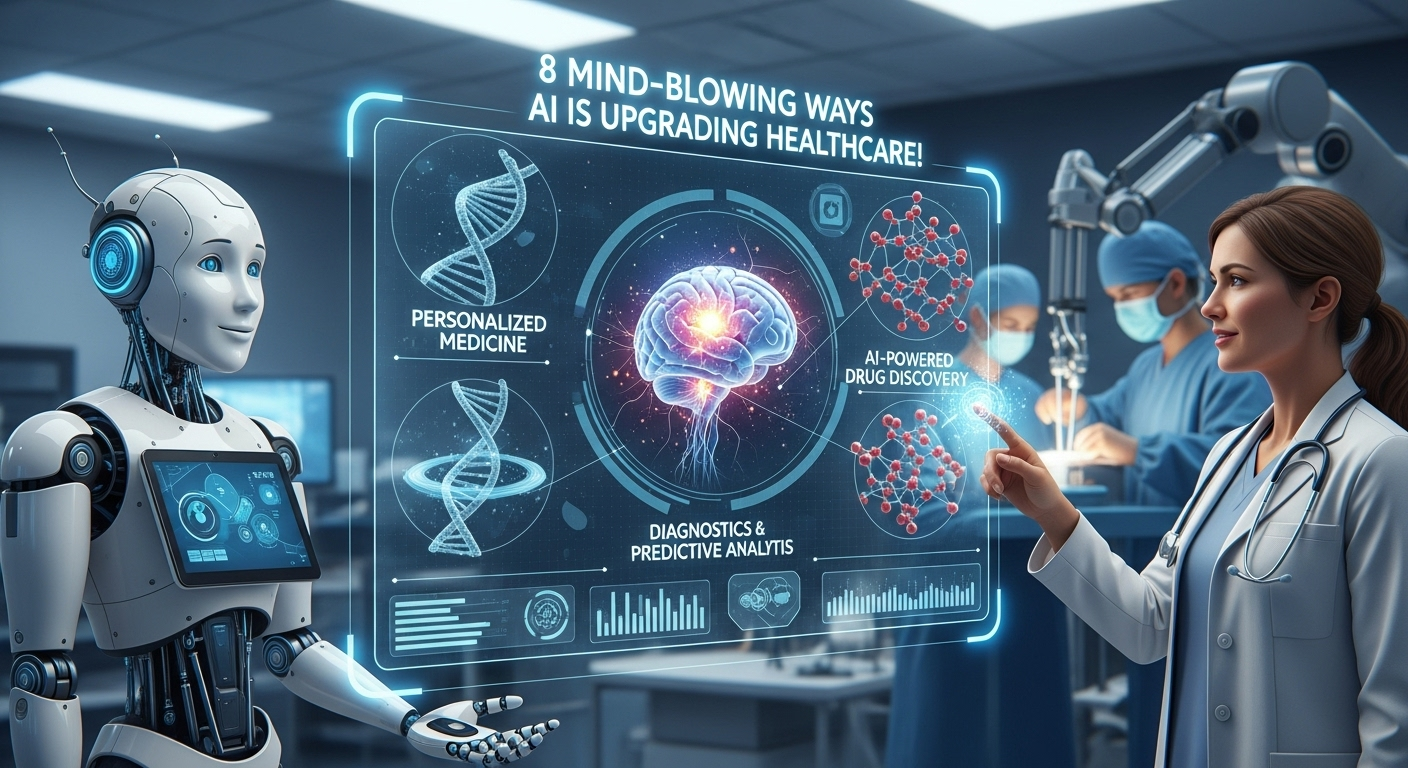Let’s be real—healthcare can sometimes feel slow, complicated, and even a little scary. But what if doctors had a super-intelligent partner that could help them diagnose faster, treat smarter, and even predict sickness before it happens? That’s not science fiction anymore. That’s Artificial Intelligence, and it’s already changing the game in ways you won’t believe.
Forget the headlines about robot takeovers. Let’s dive into the real, life-saving ways AI is making healthcare better for all of us, right now.
1. Spotting Diseases Before We Even See Them
This is one of the most incredible uses of AI. Using Deep Learning—a type of AI with complex neural networks—computers can now analyze medical images like X-rays, MRIs, and even digital **pathology** slides with superhuman accuracy. An AI can scan a chest X-ray and spot signs of lung cancer that are nearly invisible to the human eye, helping radiologists make earlier, more accurate diagnoses. Early detection saves lives, and AI is our new secret weapon.
2. Inventing Lifesaving Drugs at Lightning Speed
Normally, creating a new drug takes over a decade and billions of dollars. AI is flipping that script. A groundbreaking example is **DeepMind’s AlphaFold**, which solved the 50-year-old challenge of protein folding. By predicting a protein’s 3D structure from its amino acid sequence, AI like AlphaFold can rapidly identify drug targets and simulate how new compounds will interact with them. This is cutting years off development time and bringing new cures to patients faster than ever.
3. Giving Surgeons Super-Steady Robotic Hands
Robotic surgery isn’t new, but AI is making it exponentially better. Think of systems like the famous Da Vinci surgical system. AI algorithms help guide the robotic arms with incredible precision, eliminating natural human hand tremors and allowing surgeons to perform impossibly complex operations through tiny incisions. This means less pain, smaller scars, and faster recovery times for patients.
4. Creating Medicine That’s Uniquely YOU
Why should your medicine be the same as everyone else’s? AI is paving the way for truly personalized medicine. By analyzing your unique DNA (genomics), lifestyle, and medical history, AI can help doctors create treatment plans tailored specifically for you. This means more effective therapies with fewer side effects, because the treatment is designed for your body, not the “average” person.
5. Your 24/7 AI Health Assistant
Ever had a medical question at 2 AM? Through AI-powered chatbots and virtual assistants, you can get reliable health information instantly. This is a game-changer for Telehealth, especially in rural areas. Furthermore, AI is making huge waves in mental health. Chatbots that provide support using **Cognitive Behavioral Therapy (CBT)** techniques are offering accessible, private help to millions.
6. Predicting Sickness Before It Strikes
What if we could stop diseases before they even start? That’s the promise of AI-powered predictive analytics. By analyzing massive health datasets, AI can identify hidden risk factors. It could raise a flag and tell a doctor, “Hey, based on this patient’s data, they have a high risk of developing diabetes in the next few years.” This allows for early, preventive interventions that can save lives and lower healthcare costs.
7. Making Sense of Our Medical Records
Your Electronic Health Record (EHR) is full of valuable information, but it’s often buried in messy doctor’s notes and lab reports. AI can read and understand this unstructured data, organizing it and pulling out the most critical information by understanding key data standards like **HL7 and FHIR**. When you see a new doctor, they can get your complete, relevant medical history in seconds, leading to safer and more informed decisions.
8. Okay, But What About the Scary Stuff?
As exciting as this all is, we have to be smart about it. Patient data privacy is non-negotiable, and systems must be incredibly secure. We also have to make sure the AI isn’t biased. If an AI is only trained on data from one demographic, it might make worse recommendations for others. These ethical considerations are a huge deal, and the humans are 100% in charge of building fair and responsible AI.
Frequently Asked Questions
Q1. Can AI replace human doctors?
Not a chance. Think of AI as the world’s best co-pilot, not the pilot. It processes data and offers insights, but the final decision—and the vital human touch and empathy—will always come from a human doctor.
Q2. Is my health data safe with AI?
It has to be! Patient data protection is a top priority. All AI systems in healthcare must comply with strict regulations like HIPAA, using robust encryption and access controls to keep your information private and secure.
Q3. Will AI eliminate healthcare jobs?
It’s more likely to change jobs than eliminate them. By automating repetitive tasks, AI will free up nurses and doctors to spend more quality time with patients, focusing on complex care and decision-making.
Conclusion: A Healthier Future for Everyone
AI is not just a tool; it’s a revolutionary partner for the entire healthcare industry. From diagnosing cancer at stage one to creating personalized medicines and supporting our mental health, AI is unlocking a future where healthcare is more precise, more accessible, and more effective for everyone. The future is bright, and it’s being powered by AI.



